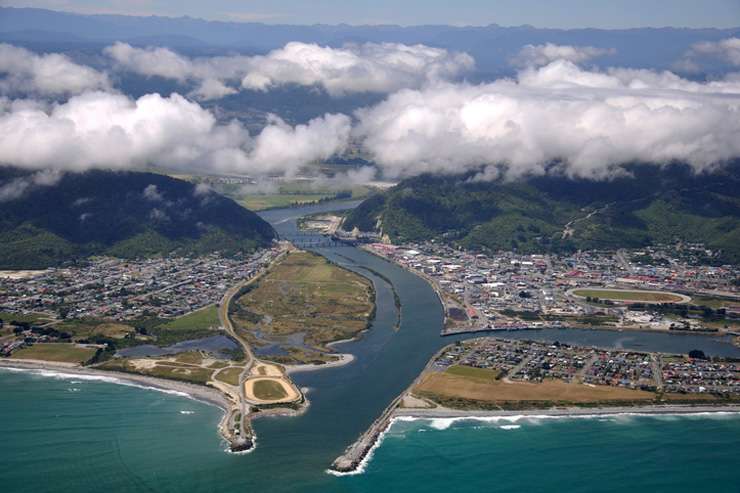New Zealand's house prices are finishing 2022 on a grim note, with rising interest rates, cost of living pressures and warnings of a recession expected to inhibit the market well into next year.
The nationwide average property value continued its downwards trajectory, dropping 3.8% ($39,000) to $1.001 million in three months to the end of November, new OneRoof figures show.
Weakening values and a drop-off in sales activity mean homeowners who bought at the height of market face on paper losses of as much $225,000 in some cases. Nationwide, prices are now 5.4% ($55,000) lower than they were a year ago.
Start your property search
Residential real estate in Greater Wellington has borne the brunt of the market downturn. The region's average property value dropped 16.7% ($184,000) in the last 12 months to $917,000, with house price inflation dropping 8% ($80,000) in the last three months alone.
Auckland has suffered the next biggest annual decline after Greater Wellington, with average property value falling 8.8% ($133,000) year on year to $1.384m.
The downturn has wiped out more than 40% of the value gains Auckland homeowners made since the country came out of the first Covid lockdown, with the city's average property value tumbling 12.4% ($195,989) since market peak in January.
In Greater Wellington, the fall from market peak has been more perilous. The region's average property has fallen 19.69% ($224,818) since peaking at $1.14m in March, with the slump eating 65% of value gains made post-Covid.
Four more regions recorded year on year declines: Hawke's Bay average property dropped 6.2% ($55,000) to $826,000; Manawatu-Whanganui's dropped 6.1% ($41,000) to $632,000; Nelson's fell 3.9% ($34,000) to $837,000; and Bay of Plenty's slid 2.3% ($24,000) to $1.001m.
James Wilson, head of valuations at Valocity, OneRoof’s data partner, said: “While property values across the rest of country are still ahead of where they were a year ago, only three regions saw values grow in the last three months.
“Southland's average property value rebounded from a 1% drop in the three months to the end of October to growth of 0.6% in the three months to the end of November. There was a similar turnaround in fortunes for Gisborne, where the average property value went from a 1.3% drop to a 0.8% rise over the same period. Declaring the slump over in both regions would be premature, with low sales volumes likely to be contributing to volatility in the numbers.
“Quarterly growth in West Coast, the country's cheapest housing market, was a stronger 4.5% ($18,000), pushing the region's average property to $421,000. The region has yet to show signs of fatigue, but again a low sales environment may be masking weaknesses in the market.”
Of the country’s 72 territorial local authorities (TAs), 16 saw value growth in the three months to the end of November, with Opotiki, in Bay of Plenty, continuing its hot run with a 9.4% lift in its average property value, now at $676,000.
Also recording strong value growth over the quarter were Hurunui, in Canterbury (up 7.5% to $717,000); Otorohanga, in Waikato (up 7% to $718,000) and Grey, in West Coast (up 6.6% to $422,000).
Property values in most TAs are higher than they were a year ago but the margins are getting smaller, with just nine TAs recording double-digit growth. The biggest year-on-year average property value lift was in Wairoa, in Hawke's Bay (up 15.8% to $470,000) while the biggest drop was in Lower Hutt, in Greater Wellington (down 20% to $814,000).

An aerial view of Greymouth, in West Coast. Property values in the South Island region have defied the slump. Photo / Getty Images
Seven other TAs saw year on year value declines of 10% or more, including neighbouring Upper Hutt (down 18.4% to $819,000); Wellington city (down 17.9% to $1.037m) and Auckland's North Shore (down 10.2% to $1.513m).
Queenstown is the country's strongest performing, and most expensive, major metro, but it too is starting to be weighed down by the slump. The city's average property value jumped 13% ($218,000) in the last 12 months to $1.892m but growth in the last quarter was just 1%.
Christchurch's previously hot market has also cooled, with prices in the city now only 3% above what they were in December, and 4.36% below market peak.
Property values are down 6.8% year on year in Dunedin and down 5.7% and 5.5% year on year in Hamilton and Tauranga respectively.
Wilson said: “The sudden turnaround in the direction of interest rates has put the brakes on the market, and the latest warnings from the Reserve Bank on the economy and unemployment, combined with an election year next year will likely keep buyers and sellers on the side-lines for much of 2023.
“Spring is usually a tonic for the market, but the trend line for sales has been downwards, with nationwide settled sales volumes falling from 90,687 in the 12 months to the end of October to 87,137 in the 12 months to end of November. Any retreat by buyers will be keenly felt by a market that already has a glut of properties for sale.”

Valocity director of valuations James Wilson: “Mortgage registrations are down due to lower sales volumes and reduced financing demand." Photo / Fiona Goodall
Wilson said that the impact of the downturn could be seen clearly at a suburb level. “Of the 2267 suburbs where there was sales activity in the last 12 months, just 885 recorded 20 or more settled sales, down from 905 in the 12 months to the end of October and down from 1014 in the 12 months to the end of March. Values in more than half of the 885 suburbs analysed are down year on year, with values in four suburbs - Mount Victoria, Roseneath and Mount Cook, in Wellington, and Newmarket, in Auckland - below where they were two years ago.”
“The on-paper losses will be especially hard for those who bought at the start of the year, with values in some suburbs down by as much as half a million dollars since market peak, although it is worthwhile noting that low sales volumes do introduce significant volatility to these suburb statistics.”
Wilson said New Zealand’s strong economy and low unemployment levels had protected the market, but the Reserve Bank's forecasts for 2023 increased the likelihood of further softening in market activity levels and value decline.
“Mortgage registrations are down due to lower sales volumes and reduced financing demand. This has created strong competition between lenders with offers of 1% cashbacks and other marketing tactics to entice borrowers to switch banks.
“A 75 basis point lift in the Official Cash Rate in November and inflation sitting at 7.2%, far outside the targeted range of 1-3%, will continue to put upward pressure on interest rates. Further OCR increases have been flagged, with a peak of 5.5% expected.
“Another factor that will put downwards pressure on demand is the end of the refinance wave, with approximately 55% of outstanding mortgages set to move onto higher rates in the coming months.”
Wilson added: “Borrowers seeking interest-only mortgages may struggle under current lending conditions and exposed investors may find themselves under pressure to sell. Cashflow difficulties are likely to further hamper the new-build market. Some developers will struggle to complete construction projects due to higher borrowing costs and materials shortages."













